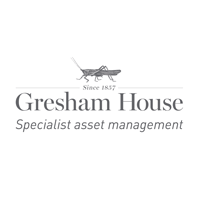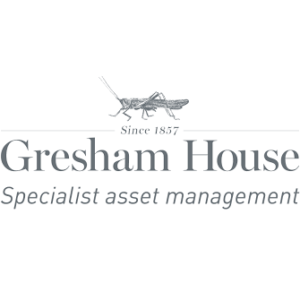Gresham House Strategic (LON:GHS) Managing Director Graham Bird caught up with DirectorsTalk for an exclusive interview to discuss financial and investment management highlights, post period performance and the outlook for the company going forward.
Q1: Graham, interim results just out for the six month period to the end of September. What can you tell us about the financial highlights?
A1: We were very pleased actually in the context of what happened in the first six months of our financial year.
We had a strong share price performance, share price rose just over 10% in the end of September which was really a reflection of the narrowing of the discount which we’ve seen come in consistently. Again, a pleasing reflection on the performance, discount came in from just around 23% at the end of March to just under 15% at the end of September.
The other highlight I think is the increase to the proposed dividend, shareholders on the register as at the 6th December will receive 10.1p per share, that’s payable on the 3rd January, and that’s in line with the Board’s commitment last year to raise dividends by 15% per annum over the next couple of years. So, that is a nice return for shareholders.
Overall, the NAV total return is now in excess of 40% since inception when we took over the management of GHS in August 2015 and that’s running up until the middle of November. So, certainly continuing to outperform the comparator indices which, again, is pleasing.
Q2: What can you tell us about the investment management highlights?
A2: The period was actually one of consolidation, we had strong NAV performance running up to the end of our financial year in March but since then, in these six months, it’s been quite a volatile market. Our NAV total return was pretty flat, it was up modestly 0.3% and that’s against the FSTE Small Cap total share return which was up 0.2% so pretty much in line with the market. Having said that, post-period end we’ve seen a strong NAV performance and up to 15th November, NAV was up a further 5.8%.
That return really reflects two halves. The first quarter, which was March to June, we had a very strong performance, NAV total return was 6.1% and that was against the Small Cap Index which was only up 0.9% but we saw that largely reverse in the second quarter to September. So, a game of two halves really in that first half of the year.
During the period, we made two new strategic investments, we put £2.3 million into Pressure Technologies where we’re supporting the new CEO Chris Walters with a new strategy and a focus on regenerating growth in the business. So, we’re quite optimistic about the opportunity for that company.
We also put in £2.1 million into a convertible loan note in a pre-IPO investment in Lakes Distillery which, again, I think is a very interesting structure for us. It effectively is a roll-up of interest, we get 8% cash interest paid on that per annum and then 12% rolled up with a view to converting once the business does IPO which they intend to do in the coming years. So, a very exciting and interesting investment there and I think a good risk reward profile that we’ve managed to secure in that investment.
We also managed to rebalance some of the portfolio, we’ve got rid of a couple of investments. We actually sold, fully or partially, five investments in the period, three of which were underperformers where we sold out in entirety.
Looking at the attribution in the half year, again, the two biggest performers. IMImobile contributed 2.8% to NAV growth and that was following the announcement of another major acquisition in the US, a business called 3Cinteractive. Following that, they’ve appointed a new President for their US business and are integrating the two other acquisitions they’ve made in North America over the last 18 months or so, SUMOTEXT and Impact Mobile.
So, that seems to be proceeding very well and I think certainly if IMImobile can achieve some success in North America, there’s some very very significant potential for the business there. So, we’re quite excited about that. We actually did realise some of the IMImobile shares in the period, just on a portfolio rebalancing basis, so sold off another 1.3 million shares which generated just over 21% IRR and just under a 2 times money multiple. So, IMI has been a very good investment for us and continues to perform.
The other good performer was Augean which contributed 2.4% to our NAV growth, its been a fantastic performer and, actually, since the period end, following further upgrades, it’s been very strong again, contributing nearly 9% NAV growth since the end of September.
Growth here has really been driven by significant increase in demand for treatment and disposal of residue from energy and waste generation and there’s a lot of investment going into that sector so I think that bodes very well for the long term future for Augean, it’s been a fantastic turnaround story. The Executive Chairman, Jim Meredith, who has taken out a lot of cost, generated fantastic cash out of the business and I think it’s very well positioned now.
So, those have been the positive performers, I guess on the negative side, we had a couple of companies which detracted from NAV performance. Hydrodec was the biggest detractor, we actually made the decision to sell the company as we discovered the supply dynamics for used transformer oil in the US is proving very complex and we think the solution for that business is going to be a bit further away. I still think it has a good potential but we came out of that and that meant a negative attribution of 1.5% to NAV.
The other investment which had a negative attribution was Be Heard which knocked us by 1.3% but I still remain fairly positive for Be Heard. The operational support and turnaround efforts that we’ve been putting in, not just to Be Heard but actually to a couple of companies, really are starting to show good progress. I think we’re certainly very confident that the business is on track to meet its market expectations so I believe that should bring some stability back to the share price. We, of course, instigated change to the management just over a year ago and under Simon Piper, who’s now running the business as Chief Executive, we think it’s a lot more stable and certainly the business is now producing good cash flow.
So, we still see it as an interesting strategic asset, there’s been a lot of activity in the sector, if you look at the likes of Martin Sorrell’s company S4 Capital and the acquisitions they’ve been making, there’s certainly evidence that that is a sector that there’s very attractive returns to be made. The two jewels in the crown, Freemavens and MMT within the Be Heard portfolio have performed very well and have offset some of the weakness that have come from market factors which have impacted The Corner and Agenda21.
Certainly, overall in terms of the investment performance and the investment management highlights, it’s been an active half with some new investments and overall, in an uncertain market environment, we’re pretty pleased where it’s landed up.
Q3: So, that’s taken us up to the end of September, and I think you touched on this earlier, how has performance looked post-period?
A3: Of course, I mentioned Augean which has performed very strongly since the period end. Just running up to the 15th November, the share price was up a further just under 12% with a discount coming in a bit further, in fact it’s now below 10% and on the 15th November, was down to 9.8% and in the last few days has closed in a bit more too. So, we’ve had some good share price performance and that’s really followed a good NAV performance as well.
NAV was up 6% between 30th September and the middle of November, again, the biggest driver of that was Augean which I mentioned and there have been a couple of others that have contributed to upward performance and one or two that have moved the other way. The biggest positive, as I said, was Augean and that is offset by Escape Hunt which has seen the share price fall quite heavily since the 30th September.
However, on Escape Hunt, I continue to see this as a very interesting play in the leisure space and to the share price fall seems to have been impacted really by their largest shareholder, Arrowgrass, going into administration. Looking at the trade volumes and so on., it looks like those shares were sold out of administration at a nearly 80% discount to what the share price when the process for the administration was announced. So, again, just evidence of some of the impact that short-term lack of liquidity in the market can have on some of these smaller businesses but certainly the performance of the business, there’s been no adverse news so I think the business is still positioned to do well.
We’ve also made a couple of new investments since the period end so we’re starting to see the outlook as positive and we see opportunity to make investments.
Q4: How would you describe the outlook for Gresham House Strategic now?
A4: Well, I think certainly, at a market level, the market has certainly been in an uncertain frame of mind for some months, we started to see a bit more positivity in the last few weeks. Going back a couple of months, the headlines have really been about trade tensions, of course Brexit is a major issue in the UK but also the trade tensions and the trade talks impacting and slowing in China and other parts of the international economy. As a result, we’ve seen global growth forecasts coming down in the last six months and all of that has been contributing towards uncertainty and all that, of course, impacts decisions by companies and we continue to see delays, particularly in investment decisions.
So, I think with that backdrop, that’s fed through into company profits warnings, it was quite interesting in Q3 I think it was the highest number of profits warnings in the UK market since 2008. So, again, just starting to see that uncertainty starting to seed through into performance.
Of, course with an election coming up, this fair degree of uncertainty around what the outcome of that might be, seems to me that if the Conservatives win a majority, whilst there might be some shorter terms certainty, we’re by no means out of the woods in terms of understanding what Brexit might mean. There’s also a pretty high probability, I guess, of some sort of hung parliament, I don’t know if that will necessarily create this certainty that people hope for but it certainly will give us more clarity than we’ve had so far.
From a GHS point of view, we’re actually looking at the outlook, I described it as ‘cautious optimism’. I Certainly, I think the current environment is a very good backdrop for our style of investment and that’s for a number of reasons.
First of all, value approach in times like this tends to perform very well and that has been our approach and as a result, we’ve got a number of companies in our portfolio which I remain of the view that they are very attractively valued, certainly relative to the market and relative to where they’ve been historically. So, there’s good upside within the portfolio.
Of course, UK equities compared to the international markets remain cheap and we all know that one of the best determinates of long-term return is the price of which one can come into investment. So, I think from a timing perspective, that’s quite interesting and of course, the discount at which small caps stocks trade to the larger cap stocks is actually wider than it’s been for some time. So, again, although the UK overall is cheap, the small cap market within that is cheaper still.
That creates quite an interesting backdrop and when you couple that with some of the structural factors which hare still having an impact, MiFID II the impact of that is still washing its way through the market and no doubt in my mind having an impact. Of course, the aftermath of Woodford and the potential rotation which certain funds may wish to, or feel that they need to do, can have some impact on share prices in the short term which are necessarily reflected of the underlying quality of those businesses. So, I think all of those things create some really interesting opportunities for a style of investment that we have so we see that as an interesting space.
In conjunction with that, we have developed our team capacity. We announced some time ago but to clarify again, we hired Richard Staveley who’s an experienced small cap investment manager having worked at River & Mercantile and other places in his career. We’re also cooperating more closely with our colleagues here at Gresham House who came from the Livingbridge teams we acquired back in December last year. So, that’s bringing a lot more capability and resource into the strategic public equity strategy for the benefit of GHS.
What you will see in future is Richard featuring more prominently as we set out in the interim statement, I will actually be stepping back from the front line to focus more on the corporate advisory aspects and with the intention of a much greater involvement with investee companies in future. Within that, remaining on the investment committee and supporting the strategy more in an advisory capacity.
So, there’s some exciting changes going on, I think the market backdrop and the current timing is interesting and a very credible time to be looking at a strategy like GHS. I think our view that we look forward with cautious optimism is the right one.



